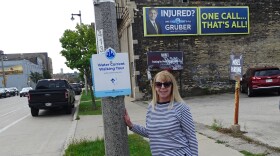One of Milwaukee's biggest public health concerns is its high teen pregnancy rate. A number of years ago, after a report showed Milwaukee among the top cities for teen pregnancies, Mayor Tom Barrett and Health Commissioner Bevan Baker announced a citywide goal to reduce the rate by 46 percent by 2015. In the fall of last year, the city reported the rate had dropped from 52 per 1,000 in 2006 to 33.4 per 1,000 girls in 2011.
While these efforts show progress is being made toward the goal, there are other efforts to help and support the teen moms already out there. That includes Rosalie Manor Community & Family Services. It is targeting a number of resources to help teen mothers through its Positive Parenting Program. The program pairs caseworkers with local teen moms to teach them parenting skills, provide financial and emotional support, encourage educational and career goals and offer guidance toward becoming contributors to the community
Anna Hammernik is a graduate of the program who has become a teacher and school leader, working in several different countries. But 18 years ago, she had just given birth to her daughter Olivia as a teenage mother. Although a happy time, it was also a period of adjustment that she emerged from with the help of the Positive Parenting Program and her supportive family.
Hammernik recounts her own experience as initially being engulfed in shock. After the initial surprise, the preparations were on their way for a new baby. Hammernik became acquainted with the program right after giving birth and was immediately receptive to the idea, because any form of support she could get would be helpful.
The Positive Parenting Program provided her with financial support and resources, but Hammernik says the biggest and most important things provided were the emotional connection and comfort. They would talk to her as a peer and guide her through her journey with the encouragement she needed.
Hammernik says the program is “critical because it offers so much of what teen parents in Milwaukee don’t get” - a venue of help for girls that do not know where to turn. Life “doesn’t stop” because of life circumstance, she points out.




